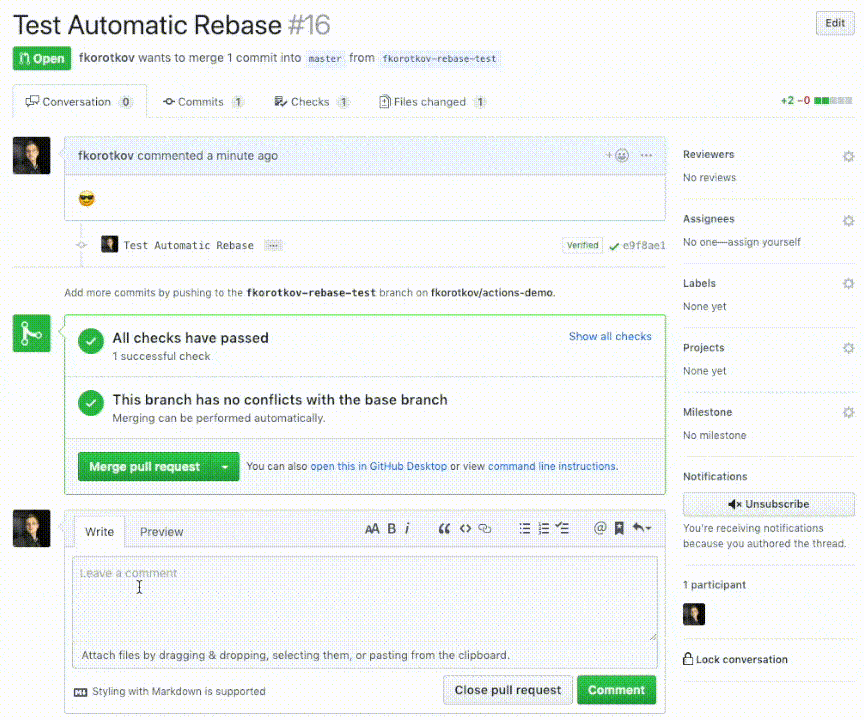Github Actions for CI/CD
Posted on Thu 23 April 2020 in Software • 4 min read
Recently the Python Bytes Awesome Package List moved to it's own repository from the blog post. This was done to enable the community be able to contribute their packages that they thought were awesome, which was a success with many pull requests already merged.
After getting a taste of CI/CD principles with Travis CI in building this blog, an idea to integrate some CI/CD with the awesome package list repository to ensure spelling errors, broken links, etc are all checked automatically. This was a great opportunity to try out Github Actions, so then all the resources/dependencies live in one place, Github.
Initially, the things to automate were:
- Checking the spelling
- Checking all the links work
Perfect, this is should be a gentle introduction to Github Actions.
Here is an example of how GitHub Actions can be used to automatically rebase. Source: https://github.com/marketplace/actions/automatic-rebase.

Action Marketplace
One amazing feature of Github Actions is that Github hosts a 'marketplace' for actions, https://github.com/marketplace?type=actions. This is awesome, because now you can just search for pre-made actions which will automate. In comparison to other CI services (let me know if there is anything similar), where you have to scour the internet looking for a post or question by someone else and piece together the action yourself.
The actions I ended up using were:
Even better is most of the actions in marketplace come with a Usage section, which is a directly example you can copy/paste into the repository and it just works.
Action Format (.yaml)
A Github Action is defined with a <action_name>.yaml file which must be placed within .github/workflows from the base of the repository. As many actions as you want can be placed in this folder, and will subsequently run when triggered.
The base structure of a link_checker.yaml file is:
1 2 3 4 5 6 7 8 9 10 11 12 13 14 | |
To break this down:
| Field | Use |
|---|---|
| name | Name of the action |
| on | The trigger to run the action (runs whenever a push happens in this example) |
| jobs | What to run when triggered |
| linkChecker | This is a job name |
| runs-on | The operating system to run on |
| steps | Steps to take once the operating system is set up |
| uses | What action to use from the marketplace (or custom specified) |
The biggest part of the action, is what the trigger is. Which the documentation behind this is amazing, see this at: https://help.github.com/en/actions/reference/events-that-trigger-workflows.
Actions on Pull Request
The original reason for implementing CI/CD is to not only check the spelling & links in the content that the owner contributes, we also want it to run on pull requests from other users. This is captured within an issue (with solution) at: https://github.com/JackMcKew/awesome-python-bytes/issues/9. The workflow for someone else to contribute to the repository is:
Fork repository > Make changes > Submit Pull Request with changes > Check changes > Merge into repository
When the action was first set up for actions to run on pull requests, it kept throwing an error:
1 | |
This was determined to be intentional design by Github as a mitigation against the possibility that a bad actor could open PRs against your repo and do things like list out secrets or just run up a large bill (once we start charging) on your account.
After speaking with Hamel Husain from Github on Twitter, he sent some great resources in the solution he found around this:
Essentially, to take 'ownership' of the changes presented in a pull request, the owner (or authorized contributor) drops a comment with a specific command (eg, /check-pr), which triggers an action. This workflow ended up like:
PR Submitted > Owner/Contributor comments keywords (eg
/check-pr) > Action triggers > Clones PR > Runs neccessary Actions > Comments back on PR results
For the Awesome Python Bytes, the action to cover this workflow ended up as (source):
Ensure to use
if: steps.prcomm.outputs.BOOL_TRIGGERED == 'true'in all subsequent jobs you want triggered if the phrase is found, otherwise the action will become recursive: check for comment, run checks, make a comment, check for comment, etc
1 2 3 4 5 6 7 8 9 10 11 12 13 14 15 16 17 18 19 20 21 22 23 24 25 26 27 28 29 30 31 32 33 34 35 36 37 38 39 40 41 42 43 44 45 46 47 48 49 50 51 52 53 54 55 56 57 58 59 60 61 62 63 64 65 66 67 68 69 70 | |